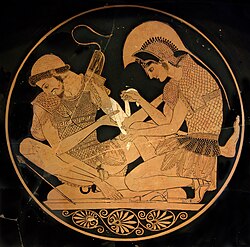
Back Epiese Siklus Afrikaans Epik sikl Azerbaijani Эпічны цыкл Byelorussian Cicle èpic Catalan Episke cyklus Danish Epischer Zyklus German Ciclo épico Spanish Ziklo epiko Basque Eeppinen kyklos Finnish Cycle épique French
This article needs additional citations for verification. (April 2016) |
| Trojan War |
|---|
 |
The Epic Cycle (Ancient Greek: Ἐπικὸς Κύκλος, romanized: Epikòs Kýklos) was a collection of Ancient Greek epic poems, composed in dactylic hexameter and related to the story of the Trojan War, including the Cypria, the Aethiopis, the so-called Little Iliad, the Iliupersis, the Nostoi, and the Telegony. Scholars sometimes include the two Homeric epics, the Iliad and the Odyssey, among the poems of the Epic Cycle, but the term is more often used to specify the non-Homeric poems as distinct from the Homeric ones.
Unlike the Iliad and the Odyssey, the cyclic epics survive only in fragments and summaries from Late Antiquity and the Byzantine period.
The Epic Cycle was the distillation in literary form of an oral tradition that had developed during the Greek Dark Age, which was based in part on localised hero cults. The traditional material from which the literary epics were drawn treats Mycenaean Bronze Age culture from the perspective of Iron Age and later Greece.
In modern scholarship, the study of the historical and literary relationship between the Homeric epics and the rest of the cycle is called Neoanalysis.
A longer Epic Cycle, as described by the 9th-century CE scholar and clergyman Photius in codex 239 of his Bibliotheca, also included the Titanomachy (8th century BCE) and the Theban Cycle (between 750 and 500 BCE), which in turn comprised the Oedipodea, the Thebaid, the Epigoni, and the Alcmeonis; however, it is certain that none of the cyclic epics (other than Homer's) survived to Photius' day, and it is likely that Photius was not referring to a canonical collection. Modern scholars do not normally include the Theban Cycle when referring to the Epic Cycle.